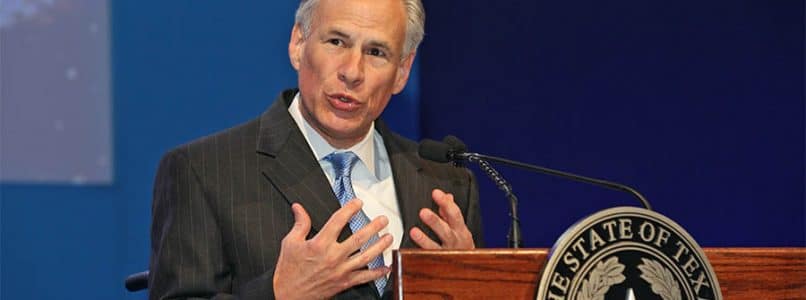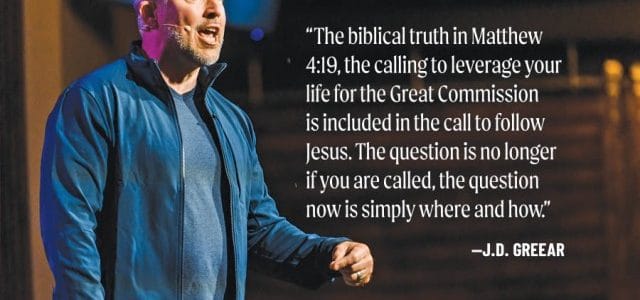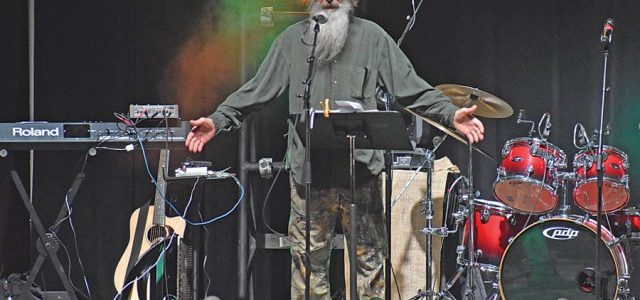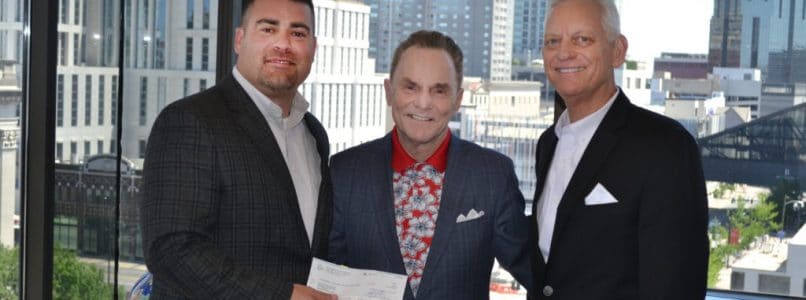NASHVILLE (BP) – Cooperation, the Great Commission, responding to godly callings and enhancing diversity will be main topics at the SBC Executive Committee’s Vision Stage at the 2021 SBC Annual Meeting June 15-16 in Nashville.
The Vision Stage, formerly the Cooperative Program stage, will target the topics in keeping with its theme, Advancing Vision 2025, according to Willie McLaurin, the EC’s vice president for Great Commission relations and mobilization.
“We have reimagined and redesigned the Cooperative Program Stage. The panel discussions will center around topics that will equip and encourage pastors and churches in their task of advancing the Great Commission,” McLaurin said. “Baptists are best when we have the opportunity to dialogue together. The Vision Stage will provide a family-friendly atmosphere where helpful conversations will take place.”
A growing slate of featured panelists will include SBC EC President Ronnie Floyd; International Mission Board President Paul Chitwood; North American Mission Board President Kevin Ezell; Franklin Avenue Baptist Church Pastor Fred Luter of New Orleans; First Baptist Church of Cleveland, Tenn., Pastor Jordan Easley; Long Hollow Baptist Church Pastor Robby Gallaty of Hendersonville, Tenn.; and D.A. Horton, associate teaching pastor of The Grove Community Church in Riverside, Calif.
This year’s panel discussions will put a “laser sharp focus” on advancing missions and ministry through the CP, McLaurin said. A select group of the more than 1,500 individuals who have been engaged virtually in the SBC Young Leader Pipeline will participate in a special panel discussion.
Other panels will focus on:
How to build a church culture that can produce more missionaries
Advancing church planting across North America
Funding missions at home and around the world
Calling out the called
Rebuilding the church post-COVID
Reaching, equipping and mobilizing Asians, Hispanics and African Americans
Reaching, baptizing and discipling 12- to 17-year-olds
Sessions on evangelism, congregational prayer and increasing ethnic diversity are also on tap. Six ethnic fellowships are participating, including the National Asian American Fellowship, the National African American Fellowship, the Fellowship of Native American Christians, the Southern Baptist Messianic Fellowship, the National Fellowship of Hispanic Southern Baptist Churches and the Filipino Southern Baptist Fellowship.
Giveaways will include “Ten Percent: A Call to Biblical Stewardship,” the curriculum study “It’s A New Day For Financial Freedom” and other stewardship resources.
A full three-day schedule of the events, which begin at 8:30 a.m. daily, will be available on the SBC mobile app and will be listed in the annual meeting’s daily bulletin.
Also slated for the exhibit hall:
Ethics & Religious Liberty Commission
The ERLC will feature its new “Stand for Life” materials and the latest issue of the award-winning Light Magazine, focused on the issue of life. Messengers and guests will receive various giveaways and will be able to write encouraging notes for distribution to expectant mothers who may be considering abortion. The notes will be sent to pregnancy resource clinics around the nation.
Gateway Seminary of the Southern Baptist Convention
The benefits of training students in the challenging setting of the American West will highlight Gateway’s exhibit. At the school’s alumni and friends luncheon June 16 at noon in room 102A/B of the Music City Center, President Jeff Iorg will report on Gateway’s journey through the COVID-19 pandemic and announce alumni award winners. Seating is limited. Tickets, $10 each, can be purchased here.
GuideStone Financial Resources
GuideStone’s popular Wellness Center will offer personal health assessments June 14-16, beginning daily as the exhibit hall opens and ending Monday and Tuesday at 6 p.m. and Wednesday at 1 p.m. The free assessments, valued at $150 each, will include blood-based cholesterol and glucose screenings, providing reports suitable to take to a family doctor. GuideStone staff will be available during all exhibit hall hours to meet with participants about their retirement accounts or to speak about insurance coverage.
Giveaways will include a backpack and water bottle at the GuideStone Property and Casualty display and the nearby booth of Brotherhood Mutual Insurance Company, with which GuideStone has an alliance to provide property and casualty coverage and education. Free copies of devotional books written by GuideStone President O.S. Hawkins will be available, including “The Nehemiah Code,” “The James Code” and “The Believer’s Code.” All author royalties and proceeds from sales of the books benefit Mission:Dignity. Free promotional materials for Mission:Dignity Sunday, June 27 on the SBC calendar, will be available at MDSunday.org, or by texting MDORDER to 41444.
International Mission Board
IMB’s 2021 exhibit will be a celebration of the unity found in our Revelation 7:9 vision – a multitude from every nation, tribe, people and language worshiping before the throne. While there is much to celebrate, 4.5 billion people remain unreached on the earth. The global need for the Gospel is more urgent than ever. The Great Commission Baptists who visit the IMB exhibit will learn how they can play a part in advancing God’s kingdom every day.
Lifeway Christian Resources
Lifeway Christian Resources’ 8,800-square-foot exhibit will offer a store containing a wide selection of books, Bibles, boxed cards, music, small-group studies, Spanish resources and other Christian products. Other features include onsite demonstrations of newly launched digital curriculum experiences and a sneak peek at recent and upcoming enhancements at lifeway.com. Lifeway’s Auxano team will be onsite to consult with church leaders about vision and mission. Visioneering Studios representatives will be available to talk with churches about intentional environments for ministry.
Lifeway staff will help messengers and guests plan and select appropriate materials for group Bible studies and offer information on Lifeway’s ongoing studies including Bible Studies for Life, The Gospel Project, Explore the Bible, and You, as well as short-term Bible studies. Digital tools to enhance personal relationships with Christ and help discipleship will be available.
Lifeway Films will be sharing information on film screenings scheduled during the annual meeting, including the Kendrick Brothers’ documentary “Show Me the Father” and the Voice of the Martyrs’ dramatic film “Sabina.”
Midwestern Baptist Theological Seminary
Prospective students are invited to visit the MBTS booth for a promo code to waive the seminary’s application fee. Admissions team members will be ready to answer questions about opportunities for training for ministry in the local church setting, on the mission field or in the marketplace. Various giveaways will be featured.
Reservations will be available at the booth for MBTS events including the For the Church Nashville micro-conference, at noon June 15, and the alumni and friends luncheon June 16 at noon.
The alumni and friends event will include a free, private concert with singer-songwriter Andrew Peterson.
New Orleans Baptist Theological Seminary
Visitors to the NOBTS and Leavell College booth will learn of exciting changes taking place at the New Orleans site, including a new House System at Leavell College, campus renovations with today’s student in mind, and Kingdom-focused degree offerings at every academic level. Faculty and admissions personnel will be on site to answer alumni and prospective students’ questions about campus life, renovations, new degree offerings and ministry opportunity in the unique ministry setting of New Orleans.
Giveaways at the booth bearing NOBTS/LC colors and a new logo highlight the NOBTS/LC commitment to prepare students to walk with Christ, proclaim His truth and fulfill His mission.
North American Mission Board/Send Relief
A virtual prayerwalk experience will highlight NAMB’s exhibit on how “The Gospel Unites” Southern Baptists in reaching North America through church planting and evangelism. Attendees will have the opportunity to learn how they can engage the mission of church planting across North America through prayer and personal involvement.
Send Relief’s exhibit will feature an opportunity for attendees to actively participate in backpack ministry and to learn how churches can share the Gospel in their communities through compassion ministry. Visitors to Send Relief’s exhibit will also have a chance to receive the forthcoming book “Make the Call” by Mark Richt, former college football coach at the University of Georgia and the University of Miami.
Seminary Extension
Those interested in the theological education and ministry training Seminary Extension offers are encouraged to visit the booth. Courses are available through select Southern Baptist associations and churches and through independent home studies. Seminary Extension staff look forward to meeting prospective students, alumni, instructors and friends.
Southeastern Baptist Theological Seminary
SEBTS will highlight its focus to “Fulfill the Mission,” designed to ignite the passion and calling that Jesus has for His disciples today. A “Pray for the Nations. Fulfill the Mission” campaign will ask visitors to commit to pray for specific unreached countries and to send postcards urging others to pray for targeted countries. Copies of the spring edition of Southeastern Magazine will be available, highlighting how SEBTS is fulfilling the Great Commission in unique ways.
Giveaways will include an iPad set and various books including “40 Questions about the Great Commission” by SEBTS President Danny Akin and George Robinson. Learn about Akin’s new resource for pastors, “Understanding the Bible (Hermeneutics).” Anyone interested in learning more about how SEBTS can help build solid theological and biblical foundations and offer valuable and practical ministry insights is encouraged to visit.
Southern Baptist Foundation
Visitors to the Southern Baptist Foundation booth will be greeted with Tennessee moon pies and encouraged to explore how they can have an impact the Kingdom by the legacy they will leave. They also will be challenged to think about causes they love and discover ways to support them. Visitors can register to win a Fender guitar autographed by multi-platinum band MercyMe. They also can win a giant soda bottle filled with money by guessing the amount. For more information, visit the booth or email sbfdn@southernbaptistfoundation.org.
Southern Baptist Theological Seminary
A number of resources and giveaways will be available for all visitors to the SBTS exhibit. Featured giveaways include the newly released “Psalms of Ascent Journal” by Jim Hamilton, and “flash giveaways” of the latest faculty publications including “The Person of Christ: An Introduction,” by Stephen Wellum; “The Church: An Introduction,” by Gregg Allison; and “The Gathering Storm” by SBTS President R. Albert Mohler Jr. The latest Southern Seminary Magazine will also be available.
Convention attendees can connect with alumni, professors, friends and prospective students throughout the exhibit area. Tickets to SBTS events will be available, including a presentation on religious liberty with Mohler and SBTS Ethics and Public Theology Professor Andrew Walker at 9 p.m. June 15 in the Music City Center’s Davidson Ballroom, and the annual alumni and friends luncheon June 16 at noon in Grand Ballroom C of the Music City Center.
Southwestern Baptist Theological Seminary
SWBTS will feature a new exhibit with quotations from SWBTS founder B.H. Carroll and the ninth and current president, Adam W. Greenway. Visitors to the exhibit will receive the latest issue of Southwestern News, with features on the Fort family’s missions legacy, which began on Seminary Hill; a student evangelist who is a refugee from Rwanda; the seminary’s doctoral programs; and an excerpt from the recent Seminary Hill Press book, “The B.H. Carroll Pulpit.”
Daily giveaways will feature seminary-branded and Texas-made T-shirts, coffee mugs and notebooks. A Ministry Now Conference prize pack will be given away, including all expenses for two to the September event and other ministry equipping resources. SWBTS faculty and staff will host the exhibit and explain the seminary’s programs. Tickets to the alumni and friends luncheon on June 16 in the Music City Center will be available while supplies last. During the luncheon, three new distinguished alumni will be honored and participants in the luncheon will receive the newest Seminary Hill Press title, “Profiles of Faithfulness: Revised and Expanded.”



















